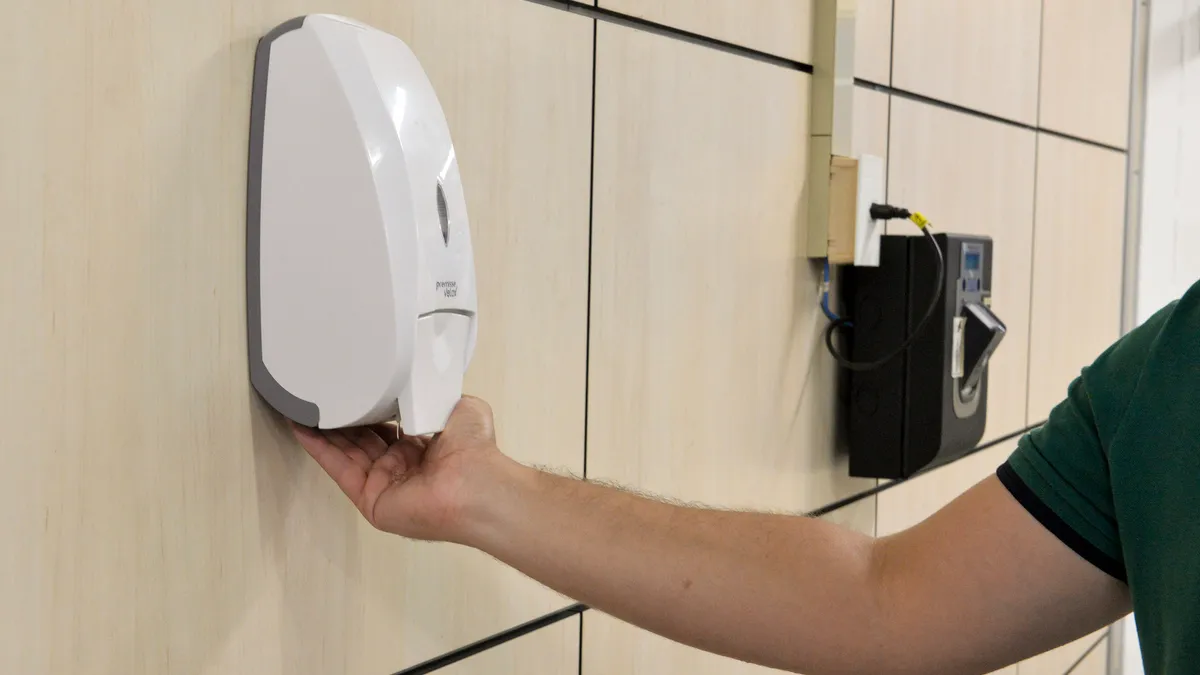Dive Brief:
- More than half of U.S. employees in a recent survey by market research company Ipsos for Eagle Hill Consulting said they are worried about being exposed to COVID-19 on the job, Eagle Hill Consulting said in an April 28 statement.
- A majority of the workers said multiple provisions could ease their fears about returning to work, namely access to protective equipment like gloves, masks and hand sanitizer; policies mandating that employees with COVID-19 stay home; and making COVID-19 testing available. Additionally, 56% of workers said employers have the right to know if employees have tested positive for COVID-19, but fewer than half (43%) supported employers testing for symptoms.
- Most employees in the survey (71%) said they have confidence that their employers can bring them back to work safely, Melissa Jezior, president and CEO of Eagle Hill Consulting said in the statement. A segment of respondents did say, however, that they wanted their organizations to continue transparent and open communication from leadership, remote work flexibility and employee wellness efforts.
Dive Insight:
The reopening of workplaces has proven politically contentious in the U.S. A number of states have begun to lift social distancing restrictions including "stay-at-home" orders, and the majority of them are in the Midwest and South, according to The New York Times.
Employers may decide, as a precaution, to test employees for COVID-19 on-site before they're allowed to return to work. That's OK, according to April 23 guidance from the U.S. Equal Employment Opportunity Commission (EEOC), so long as the testing is "job related and consistent with business necessity." Additionally, employers may require that employees be symptom-free for a period of time before returning to work, a source previously told HR Dive. But COVID-19 testing equipment has proven difficult to acquire, and employers may opt for easier routes like temperature checks, which EEOC has also approved given certain circumstances are met.
Testing isn’t the end of employers' compliance concerns when it comes to reopening, however. Attorneys on a Cozen O'Connor webinar last month said employers must pay attention to state and local guidelines on reopening, which may vary widely. Employees may also be fearful about returning to work in spite of an employer's reassurances, which could lead to discrimination claims, among other outcomes.
Guidance from the Centers for Disease Control and Prevention (CDC) has advised employers to inform employees of potential exposure to COVID-19 in the workplace in the event that an employee is confirmed to have the disease. But employers should still maintain confidentiality as required by the Americans with Disabilities Act, CDC said, and should instruct employees on how to proceed in accordance with CDC guidelines. HR vendor Kronos announced last week its launch of a contact tracing tool that allows employers to identify and communicate with employees who may have come into contact with a worker who has tested positive or is presumed positive for COVID-19.
For businesses that continue to operate through the pandemic, remotely or otherwise, fatigue has become a concern as employees work longer hours and spend more time in meetings, according to an April study published by Clockwise, a software company. Virtual solutions like wellness apps, counseling or telehealth visits may be effective levers for sustaining employees' mental health, while managers may opt to invite workers to virtual happy hours or lunches as a way of keeping connected.
Employers have also created flexible time off and scheduling policies during the pandemic for those impacted by illness, school closures or other events.













